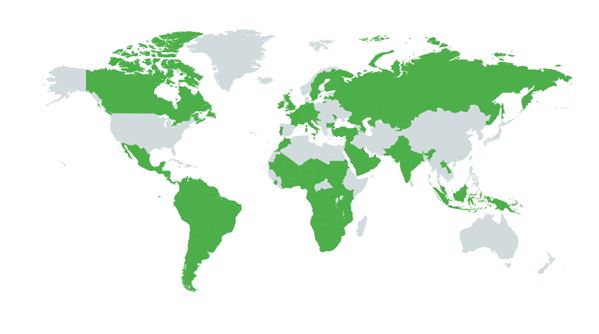At its launch, WhatsApp failed to arouse interest among Americans. Yet, its potential remains potent: the opportunity to send countless messages to friends as long as you had an Internet connection. It was an immediate hit in countries that relied mainly on text messaging, whose costs were quite high.
It did not take long for users worldwide to think of WhatsApp as the Internet. It is the platform where over two billion people exchange messages with friends, form self-help groups, close business transactions, and much more. In other words, it is a super app. You can tell this from the chaos faced when WhatsApp encounters a few minutes of downtime.
Whereas there are countries where WhatsApp is doing extremely well, the messaging platform never took off as fast as expected in the United States. One of the reasons cited is the prominence of iPhones in the U.S. market. Apple’s iMessage is relatively cheap and has no SMS fees. Additionally, WhatsApp may have failed to catch on in the U.S. due to users’ old carrier habits and the availability of other instant messaging solutions. As such, the app never pushed for growth in the U.S. market as it did with developing countries.
WhatsApp now has an interest in the U.S. market
Despite this slow start in the U.S., WhatsApp is now set to dominate this market. Its main advantage is its offer of privacy. That may come as a surprise to some people as the messaging app is owned by Meta (Formerly Facebook), a company embroiled in several privacy incidents with the government and general public.
Meta plans to change the mindset of Americans towards using WhatsApp over privacy concerns through marketing.
The company has a detailed marketing plan that focuses on WhatsApp as a highly secure messaging platform. The advertisements emphasize that using unencrypted messages is the same as a stranger opening one’s physical mail. These adverts will run both online and on billboards all over the country.
These marketing efforts aim to bring more U.S. users into the WhatsApp ecosystem by highlighting it as a secure mobile messaging platform.
Comparisons will be made against other services deemed to lack mobile compliance, since they send unencrypted messages.
WhatsApp comparison with iMessage and RCS | |||
| Feature | RCS | iMessage | |
| Encrypted messaging | YES | Working on it | No plans |
| Large file sharing of 100 MB | YES | YES | YES |
| Read receipts | YES | YES | YES |
| Chat backup | Local and cloud backup | It relies on Android’s system backup | Supports iCloud backup |
| Group chats | YES | YES | YES |
Globally, WhatsApp stands out as the most used mobile messaging app. It has an estimated two billion active users, effectively out-ranking WeChat (1.2 billion users) and Facebook Messenger (1.3 billion users). The platform takes the third position in the most popular social network app ranking, after Facebook and YouTube.
The following is a breakdown of the top 10 countries using WhatsApp and their respective audiences:

The case for WhatsApp over other messaging platforms
Meta believes that it has unique strengths that are useful selling points.
- Apple’s reluctance to adopt encryption on iMessage
As mentioned, the majority of U.S. smartphone users are on the iPhone. Its popularity is unmatched despite occasional complaints against the iOS-based device. That translates to most people finding it to communicate through iMessage than any other messaging solution.
However, things are changing as more people learn about the difference between encrypted and unencrypted messages. WhatsApp has made the first major leaps in encrypting its messages.
Google’s Android devices are also catching up. Google is currently rolling out RCS, an upgrade to SMS that introduces new features like read recipients and encryption. Apple still lags and has shown no interest in creating compatibility between RCS and iMessage. That gives WhatsApp the boost it needs to cut through the market.
That could explain the rapid uptake of WhatsApp globally. The messaging platform currently boasts of 2 billion users, making it the most popular messaging app worldwide. India stands out as WhatsApp’s biggest market, with 340 million users. The breakdown of top 10 countries using WhatsApp is as follows:
- Indian – 340 million
- Brazil – 99 million
- United States – 68 million
- Indonesia – 60 million
- Mexico – 57 million
- Russia – 54 million
- Germany – 44 million
- Italy -33 million
- Spain – 30 million
- United Kingdom – 27.6 million

- Availability on iOS and Android
The world’s biggest mobile operating systems, Android and iOS, support WhatsApp. The platform gains an advantage in this aspect because a potential target audience detests the frustrations of cross-platform messaging. With WhatsApp’s ongoing innovations, users have an easy way to synchronize their chat history, the mobile operating system notwithstanding.
Even more intriguing is WhatsApp’s latest rollout of beta features that allows users to connect up to four devices to the same WhatsApp account, meaning that you can connect the same WhatsApp account on your iPhone, Android smartphone, MacBook, and PC—an obvious major win for Meta.
- Improved audio and video calling
Have you had an opportunity to make a call through WhatsApp recently, whether audio or video? if so, you likely appreciated the many enhancements the platform has made on this feature.
As more Americans connect online due to COVID restrictions, video and audio calling have become the primary modes of reaching colleagues, friends, and families. The typical conference calling apps like Zoom may have done some good work to become user-friendly, but they are still not at WhatsApp’s level.
With WhatsApp, you can call anyone at the click of a button. You have to open the contact and click on the Call Button for audio and video as desired. It does not require complicated steps to add more people to the call. Such simplicity is sure to sink well with most Americans, provided it is well marketed. On the other hand, business leaders will need to capture voice calls via WhatsApp and implement whatsapp call recording as part of the regulatory requirement.
As WhatsApp sets in motion its market efforts to potentially attract more U.S. users, a key question arises. How will business leaders manage to monitor text messages of their staff operating in highly regulated industries that require mobile archiving? These are key issues that must be addressed because WhatsApp has become a major medium of communication in the business environment. It is no longer just a platform for messaging friends. TeleMessage addresses these challenges.
About TeleMessage
TeleMessage offers employees the freedom to use modern messaging applications on the mobile and desktop. Our mobile archiving products securely record content from mobile carriers and mobile devices, letting companies meet recordkeeping regulations and compliance requirements.
With multiple archiving solutions, you can always find the right tools or blend for your requirements:
- Network Archiver
- Enterprise Number Archiver
- Android Archiver
- WhatsApp Archiver
- WeChat Archiver
- Signal Archiver
- Telegram Archiver
TeleMessage offers cross-carrier and international mobile text & calls capture and archiving for corporate and BYOD phones. Visit our website at www.telemessage.com to learn more about our mobile archiving products.

